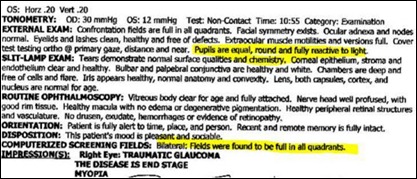The article about Pediatric Associates in CA has a nugget with a potentially outsized impact: the implication that VFC vaccines…
News 9/13/12
From Green Shades: “Re: EMR garbage. An ophthalmologist forwarded me this EHR-generated note from another physician, saying this is ‘typical of what I see.’ Note that this patient has been BLIND in the right eye since childhood. Garbage in, garbage out. EMRs that have pre-populated fields or standardized data that create bad data are much worse than medical records with missing data.” Is the garbage the result of a low-end EMR that doesn’t offer more customization for the specialty? Or is the problem that the EMR has an inefficient workflow and selecting anything beyond the standard defaults is too time consuming? Or is the physician and his/her staff not taking the time (or lack the time) to customize the templates and documentation? Even if a “bad” EMR is to blame, isn’t it ultimately the physician’s responsibility to make sure the documentation is accurate?
From L. Sternin: “Re: specialists and Meaningful Use. I can only comment for psychiatry and why more are not attesting for MU. The MU provisions aren’t particularly meaningful for us and require a lot of extra documentation that we wouldn’t otherwise do, such as check vital signs every visit. It’s straightforward to do when indicated, but not simply to meet arbitrary MU criteria since the time would be taken from other important tasks. Many EHRs do not have psychiatry-specific documentation templates and the choice of menu items for quality measures under MU are not straightforward for all psychiatric patients. Even a requirement such as giving a visit summary seems rather inane if seeing someone every few weeks for psychotherapy when medications or other information is unchanged. Furthermore, many EHR systems are not well designed in terms of protecting the privacy of sensitive information which makes clinicians (and patients) reluctant. The amount of incentive that would be received can be fairly paltry depending on how many Medicare patients one sees. There are some good reasons to implement an EHR, if it’s well designed to begin with, but for most of my psych colleagues, MU doesn’t seem to be one of them.”
Vitera Healthcare kicks off its VIBE 2012 user conference this week in Orlando.
CMS hosts a National Provider Call on September 13 to clarify details of the Stage 2 final rule.
Key-Whitman Eye Center (TX) selects Versus Advantages RTLS from Versus Technology to track patient progression and staff workflows.
St. Vincent Health (IN) offers iSALUS Healthcare’s OfficeEMR to its independent physicians.
UC Davis researchers find that health expenditures are 10% less for patients that have access to office-based care on evenings or weekends, versus patients with no after-hour care options. The study, which was published in the Annals of Family Medicine, found an association with lower prescription drug and office visit-related expenditures for tests when patients had access to care after-hours.






From Healthcare Finance News, Sept 11, 2012.
An impact of the ACA that may not have been predicted:
Welch Allyn to cut 10 percent of workforce
Medical device firm Welch Allyn announced Monday it will reduce its workforce by 10 percent over the next three years in reaction to the 2.3 percent medical device tax slated to begin in January 2013 in accordance with the Affordable Care Act.
Re: EHRs and meaningful use for specialists, here’s one radiologist’s view of how to create a customized EHR that is vendor-neutral and available in the cloud. Presumably this approach could also be adapted for other specialists. This article is from the Journal of the American College of Radiology: http://bit.ly/GD6Sd4
AuntMinnie.com summary at: http://bit.ly/N92xPf
Re: “Even if a “bad” EMR is to blame, isn’t it ultimately the physician’s responsibility to make sure the documentation is accurate? ”
Yes, but … why have an EMR if it doesn’t assist? For the money spent, an EMR should have enough programmed “intelligence” to earn its keep in helping doctors. The EMR “knows” about end stage traumatic glaucoma in the right eye. Why did it not flag the exam as incompatible?